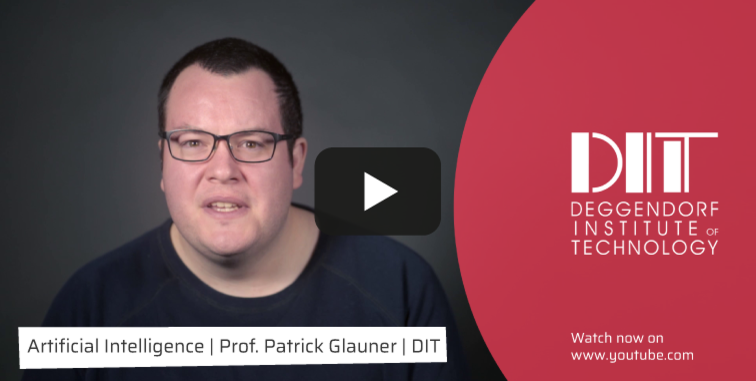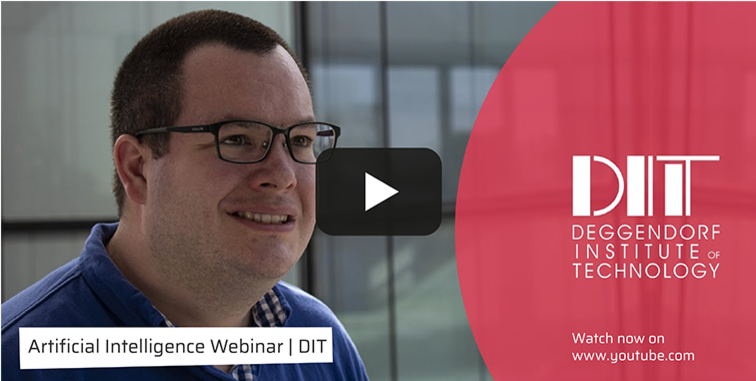Shape Digital Change
Become Part of the Megatrend
We provide support for internships, starting a job in a company, or setting up your own business

Artificial intelligence enriches every area of life
#AI #artificialintelligence #AI #machinelearning #computerscience #datascience #algorithms #statistics #computervision
#naturallanguageprocessing #deeplearning #bigdata #industry4.0 #autonomousdriving #robotics #medicalimaging #languageprocessing #generativeAI
In the exciting world of artificial intelligence, you will learn to programme computers so that they can make independent decisions and perform tasks that are normally done by humans. As a student on the all-English Artificial Intelligence degree programme you will acquire the specialist knowledge required to build AI systems. In the beginning, the programme covers basic topics such as mathematics, programming, algorithms and data structures, operating systems, networks and databases. As you progress, you will explore complex AI topics such as machine learning, computer vision, natural language processing, big data, deep learning, autonomous robotics and computational logic.
In the sixth and seventh semesters, you can customise your studies by taking elective courses that match your interests and personal focus, such as healthcare, mobility, energy management, production, shared-cost services/providers or gaming. This English-language bachelor's degree programme also provides excellent preparation for an international working environment.
After successfully completing your studies, you will be able to use AI solutions to solve problems in specialist departments. AI also enables better management of limited resources, strengthening the balance between economic and ecological sustainability.
Fact Sheet Artificial Intelligence
Degree: Bachelor of Science (B.Sc.)
Duration: 7 semesters (3.5 years)
ECTS points: 210
Start: October (winter semester)
Study Location: Deggendorf
Taught in: English
Application period: 15/04-15/06
Course specialities:
- Special feature of the degree programme: The first semester lectures can be completed either on campus in Deggendorf or online from home (the final decision is up to the lecturer). However, the examinations must be taken on campus.
Admission requirements:
- University entrance qualification from Germany, or for international degrees please consult the DAAD website.
- Admission Test (Task areas: mathematics with differential calculus, linear algebra and probability theory as well as logic and computer science at upper secondary level).
- Further information: Assessment Test
- For optimal preparation: Example Admission Test
- To check your results: Example Admission Test with solution
- The test for admission to the winter semester is expected to take place in May and June. It is not possible to choose the date. You will be invited to an appointment if you are deemed suitable.
- Language Requirements
- If English is not your native language, proof of sufficient English skills is necessary
Prerequisites: Knowledge of basic STEM subjects is an advantage
Application procedure: Read step by step of how to apply
Postgraduate opportunities:
- M.Sc. Applied Computer Science/Infotronics
- M.Sc. Applied Research
- M.Sc. Business Informatics
- M.Sc. Artificial Intelligence/Data Science
Fees:
- No tuition fees, only student union fee
- International students from non-EU/EEA countries are required to pay service fees for each semester. Click here to read about our service fees.
Contact:
- Information about the programme content: ain-b-info@th-deg.de
- For general enquiries about studying at DIT contact our prospective student advisors
- General information about studying at DIT: Study orientation
- Information for freshers
We also offer the degree programme in German: B.Sc. Künstliche Intelligenz

What drew me to this Bachelor Artificial Intelligence program was its unique combination of theory and hands-on experience. The curriculum helps me to build a solid foundation in machine learning, neural networks, and data science, while also equipping me with essential ethical considerations and real-world applications in the AI field. Through collaborative projects, research opportunities, and access to modern AI labs, I've been able to apply my knowledge to practical challenges - from image detection to large language models, and robotics. This program is special due to its strong focus on industrial application and practical training. I believe I can gain a lot through involving real-world AI projects in my studies.
Xueying Wu, Student Artificial Intelligence
I chose to study Artificial Intelligence at DIT because I’ve always been fascinated by how machines can learn to overcome challenges like humans. I didn’t just want to use AI tools, I wanted to understand how they work and eventually build them myself. The field is growing incredibly fast, and the possibilities after graduation are limitless, from robotics to healthcare to smart systems. Almost every part of modern life is being shaped by AI, and I want to be part of that change.
Alif, Student Artificial Intelligence

Do you have questions about the degree program or student life at DIT? Then feel free to contact Xueying, Alif or one of our Student Ambassadors directly.
Career Prospects
Almost every industry needs automated decision-making by means of AI in order to remain competitive. Examples of artificial intelligence applications include automated driving, smart homes, facial recognition, music streaming, medical image processing and diagnostics, predictive maintenance, navigation, robotics and digital voice assistants. You will be able to work in all of these areas. As a graduate, you will be able to analyse data, develop AI systems, manage AI projects, advise managers and clients on these topics and conduct research in the field of AI. With extensive ongoing investment in AI by companies and governments, there are many job opportunities for you, such as:
- Data scientist
- AI engineer
- Software engineer
- Consultant
- Business developer
- Project manager
- Researcher
There are potential employers for graduates of this degree programme in all sectors, particularly in the software industry. However, another option for you is to start your own business after graduating.
Good to know
Admission is a combination of the required university entrance qualification (document check via anabin) and an admission test.
The admission test consists of multiple-choice questions in mathematics with differential calculus, linear algebra and probability theory as well as logic and computer science at upper secondary level. You'll also be required to write a 200- to 300-word essay. You can find a sample test here. After completing the test, you can view the solution.
For admission you need English skills at level B2. By the end of your studies, you must also be able to demonstrate German language skills at level A2. You can find the exact language requirements here
There is no obligation to attend lectures in the first semester. However, it is up to the lecturers how they make their materials available online (live participation in the lecture, recording the lecture or uploading the teaching materials).
No. You must be on site at DIT for ALL exams.
Here you can find a guide to writing your bachelor's thesis
Subject Overview
Overview of lectures and courses, SWS (Semesterwochenstunden = weekly hours/semester) and ECTS (European Credit Transfer and Accumulation System) in the Bachelor's degree Artificial Intelligence.
| 1. Semester | SWS | ECTS | |
| Mathematics 1 | 4 | 5 | |
| Programming 1 | 4 | 5 | |
| Foundations of Computer Science | 4 | 5 | |
| Operating Systems and Networks | 4 | 5 | |
| Introduction to Artificial Intelligence | 4 | 5 | |
| Key Competencies 1 | 4 | 5 | |
| 2. Semester | SWS | ECTS | |
| Mathematics 2 | 4 | 5 | |
| Programming 2 | 4 | 5 | |
| Algorithms and Data Structures | 4 | 5 | |
| Internet Technologies | 4 | 5 | |
| Computational Logic | 4 | 5 | |
| Key Competencies 2 | 4 | 5 | |
| 3. Semester | SWS | ECTS | |
| Databases | 4 | 5 | |
| Statistics | 4 | 5 | |
| Project Management | 4 | 5 | |
| Assistance Systems | 4 | 5 | |
| AI Programming | 4 | 5 | |
| Key Competencies 3 or German | 4 | 5 | |
| 4. Semester | SWS | ECTS | |
| Natural Language Processing | 4 | 5 | |
| Human Factors and Human-Machine Interaction | 4 | 5 | |
| Machine Learning | 4 | 5 | |
| Computer Vision | 4 | 5 | |
| Software Engineering | 4 | 5 | |
| Key Competencies 4 or German | 4 | 5 | |
| 5. Semester | SWS | ECTS | |
|
- | 30 | |
| 6. Semester | SWS | ECTS | |
| Seminar Current Topics in AI | 4 | 5 | |
| Autonomous Robotics | 4 | 5 | |
| AI Project | 4 | 5 | |
| Deep Learning/Big Data | 4 | 5 | |
| Compulsory Elective Module 1 | 4 | 5 | |
| Key Competencies V or German | 4 | 5 | |
| 7. Semester | SWS | ECTS | |
| Compulsory Elective Module 2 | 4 | 5 | |
| Compulsory Elective Module 3: AI Applications 1 | 4 | 5 | |
| Compulsory Elective Module 4: AI Applications 2 | 4 | 5 | |
|
2 | 2 | |
|
12 | 12 |





